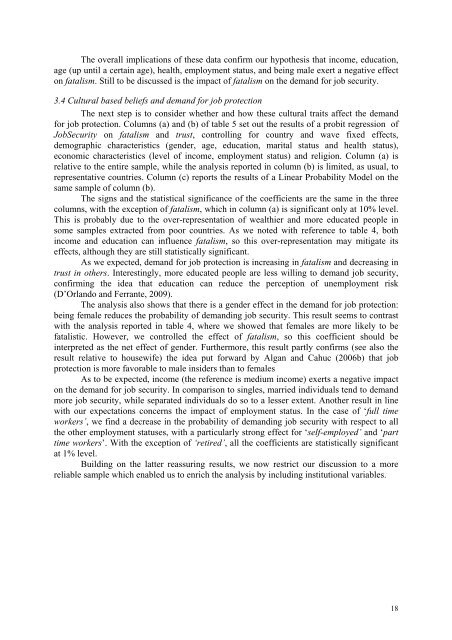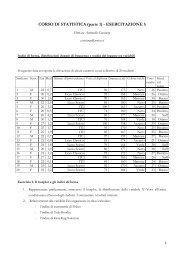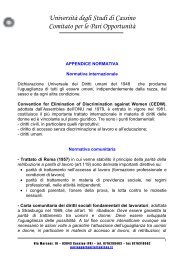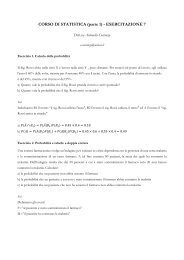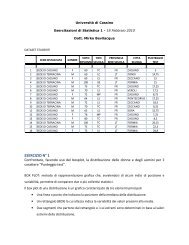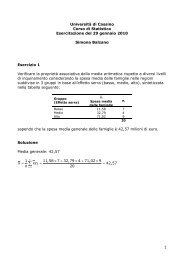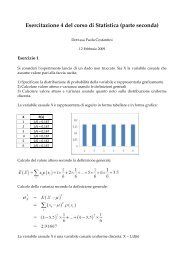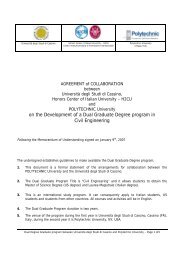Culturally-based beliefs and labour market institutions - dipse ...
Culturally-based beliefs and labour market institutions - dipse ...
Culturally-based beliefs and labour market institutions - dipse ...
Create successful ePaper yourself
Turn your PDF publications into a flip-book with our unique Google optimized e-Paper software.
The overall implications of these data confirm our hypothesis that income, education,age (up until a certain age), health, employment status, <strong>and</strong> being male exert a negative effecton fatalism. Still to be discussed is the impact of fatalism on the dem<strong>and</strong> for job security.3.4 Cultural <strong>based</strong> <strong>beliefs</strong> <strong>and</strong> dem<strong>and</strong> for job protectionThe next step is to consider whether <strong>and</strong> how these cultural traits affect the dem<strong>and</strong>for job protection. Columns (a) <strong>and</strong> (b) of table 5 set out the results of a probit regression ofJobSecurity on fatalism <strong>and</strong> trust, controlling for country <strong>and</strong> wave fixed effects,demographic characteristics (gender, age, education, marital status <strong>and</strong> health status),economic characteristics (level of income, employment status) <strong>and</strong> religion. Column (a) isrelative to the entire sample, while the analysis reported in column (b) is limited, as usual, torepresentative countries. Column (c) reports the results of a Linear Probability Model on thesame sample of column (b).The signs <strong>and</strong> the statistical significance of the coefficients are the same in the threecolumns, with the exception of fatalism, which in column (a) is significant only at 10% level.This is probably due to the over-representation of wealthier <strong>and</strong> more educated people insome samples extracted from poor countries. As we noted with reference to table 4, bothincome <strong>and</strong> education can influence fatalism, so this over-representation may mitigate itseffects, although they are still statistically significant.As we expected, dem<strong>and</strong> for job protection is increasing in fatalism <strong>and</strong> decreasing intrust in others. Interestingly, more educated people are less willing to dem<strong>and</strong> job security,confirming the idea that education can reduce the perception of unemployment risk(D’Orl<strong>and</strong>o <strong>and</strong> Ferrante, 2009).The analysis also shows that there is a gender effect in the dem<strong>and</strong> for job protection:being female reduces the probability of dem<strong>and</strong>ing job security. This result seems to contrastwith the analysis reported in table 4, where we showed that females are more likely to befatalistic. However, we controlled the effect of fatalism, so this coefficient should beinterpreted as the net effect of gender. Furthermore, this result partly confirms (see also theresult relative to housewife) the idea put forward by Algan <strong>and</strong> Cahuc (2006b) that jobprotection is more favorable to male insiders than to femalesAs to be expected, income (the reference is medium income) exerts a negative impacton the dem<strong>and</strong> for job security. In comparison to singles, married individuals tend to dem<strong>and</strong>more job security, while separated individuals do so to a lesser extent. Another result in linewith our expectations concerns the impact of employment status. In the case of ‘full timeworkers’, we find a decrease in the probability of dem<strong>and</strong>ing job security with respect to allthe other employment statuses, with a particularly strong effect for ‘self-employed’ <strong>and</strong> ‘parttime workers’. With the exception of ‘retired’, all the coefficients are statistically significantat 1% level.Building on the latter reassuring results, we now restrict our discussion to a morereliable sample which enabled us to enrich the analysis by including institutional variables.18


